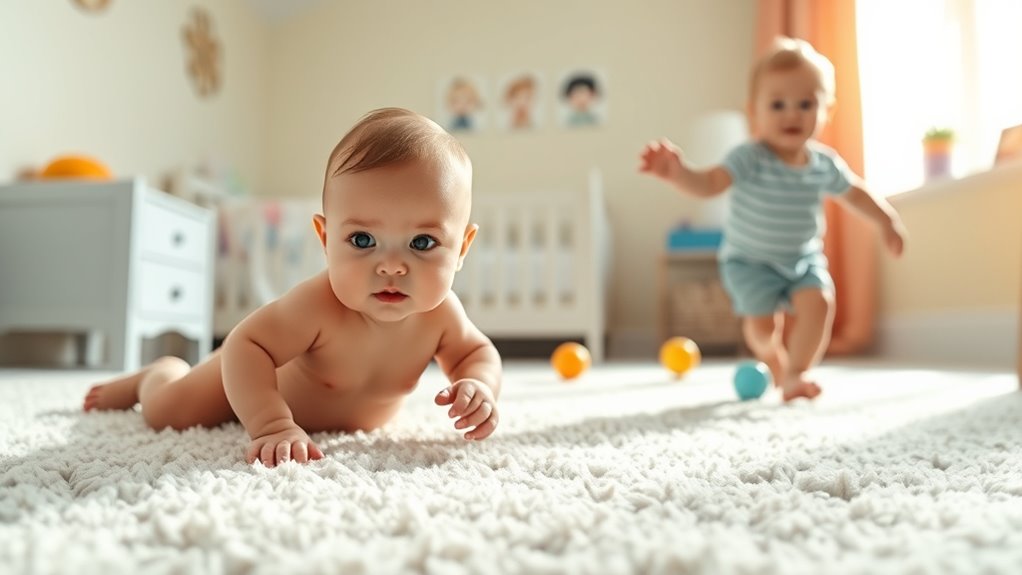Most babies start rolling over between 4 and 6 months, which marks important sensor and muscle development. Crawling typically begins around 9 months, helping your little one gain strength and confidence in movement. Walking usually happens between 12 and 15 months as they develop coordination and balance. Every baby is unique, so some reach these milestones earlier or later. Keep exploring these exciting stages, and you’ll discover more about your child’s growth along the way.
Key Takeaways
- Rolling over typically occurs between 4-6 months, marking early sensor and muscle development.
- Babies usually start crawling around 9 months, enhancing mobility and spatial awareness.
- Walking often begins between 9-15 months, after gaining strength from crawling and standing.
- Milestones can vary; some infants skip crawling and move directly to pulling up or standing.
- Early motor skills like rolling and crawling support later walking development and overall coordination.

Understanding the key milestones in your baby’s development can help you track their growth and celebrate their achievements. One of the earliest signs of progress is when your baby begins to roll over, which usually happens between four and six months. During this stage, their sensor development is advancing rapidly, allowing them to better understand their body’s position in space. They start to recognize how different parts of their body move and work together, which is essential for more complex movements later on. As your baby practices rolling, they’re also honing their muscle strength and coordination, setting the foundation for crawling and walking. Watching them roll from tummy to back or vice versa is a delightful reminder of how they’re beginning to gain control over their body. sensor development plays a crucial role in their overall growth and ability to explore their environment effectively.
Rolling over between four and six months marks key sensor and muscle development milestones.
As your little one grows, you’ll notice their curiosity about the world increase. This curiosity is closely linked to their language acquisition and sensory development. Around six to ten months, many babies start to sit unassisted, showing improved balance and core strength. During this period, they become more aware of their surroundings, exploring objects with their hands and mouth, which further stimulates their sensory development. This exploration not only helps them understand different textures and shapes but also encourages cognitive growth. Their ability to process and interpret sensory input is crucial for developing communication skills, as they begin to associate sounds with objects and actions. You might notice your baby babbling more, imitating sounds, or responding to their name—early signs of language acquisition that mark their growing social and cognitive skills.
When your baby reaches around nine months, crawling often begins. This is a significant milestone that marks the transition from purely sensory exploration to active mobility. Crawling helps strengthen their muscles and improves their coordination, while also giving them a new perspective on their environment. It’s an exciting phase because your baby is learning to navigate space on their own, which boosts confidence and independence. While each baby develops at their own pace, some may skip crawling altogether and go straight to pulling up or standing. Regardless of the method, these movements are all signs that your child’s motor skills and sensor integration are progressing well. As they become more mobile, you’ll notice their language skills also improve—they’ll start pointing, gesturing, and using simple words to communicate their needs and desires, further advancing their language acquisition.
Frequently Asked Questions
How Do I Encourage My Baby to Start Crawling?
To encourage your baby to start crawling, make sure you give plenty of tummy time daily, helping strengthen their muscles. Engage in sensory play by offering textured toys and safe objects to explore, which motivates movement. Get down on the floor with your baby, encouraging them to reach and pivot. Celebrate small progress to build confidence. Consistent, supportive interactions foster their curiosity and physical development, making crawling a natural next step.
What if My Baby Skips Crawling Altogether?
If your baby skips crawling altogether, it might feel like the world’s ending, but don’t panic. Every baby develops at their own pace, and some skip certain motor skills without issues. Skipping crawling can still lead to successful walking and other milestones. Focus on providing a supportive environment for overall development, and consult your pediatrician if you’re concerned. Remember, developmental milestones aren’t a race—they’re a unique journey.
When Should I Worry About Delayed Walking?
If you’re concerned about delayed walking, trust your instincts and monitor your baby’s motor development. Most babies walk between 9 and 15 months, but some may take longer without issue. Parental concern is natural, yet every child develops at their own pace. If your baby hasn’t started walking by 18 months or shows signs of muscle weakness or coordination problems, consult your pediatrician to make certain there are no underlying issues.
Are There Activities That Promote Rolling and Crawling?
Imagine your baby becoming a super explorer! To boost rolling and crawling, immerse yourself in sensory play with textured toys and colorful mats—these ignite curiosity. Make tummy time engaging by placing interesting objects just out of reach, encouraging your little one to reach, stretch, and eventually move. These activities turn learning into a fun adventure, helping your baby develop essential muscles and coordination for their exciting journey ahead.
How Do I Differentiate Between Normal and Concerning Developmental Delays?
You should watch for signs that your child’s development falls outside typical ranges. If they show little interest in activities or delay in reaching milestones, consider early intervention and schedule a developmental screening. These steps help identify delays early, so you can get the right support. Staying attentive and consulting a healthcare professional if something seems off guarantees your child gets the help they need to thrive.
Conclusion
By understanding when your baby typically reaches rolling, crawling, and walking milestones, you can better support their growth. Did you know that about 90% of babies start crawling by 10 months? Remember, every baby develops at their own pace, so don’t worry if your little one hits these milestones a little earlier or later. Celebrate each step forward—each one is a sign of their incredible progress and growing independence.










